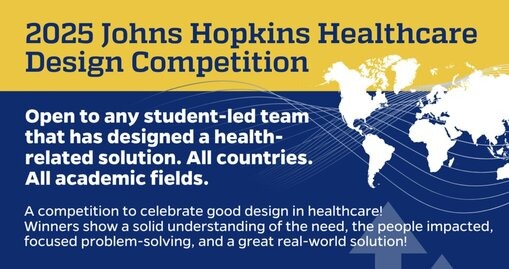Transform Healthcare, Win $5,000: Johns Hopkins Seeks Next-Gen Student Innovators for 2025 Design Challenge
Are you a student passionate about healthcare innovation and design? The prestigious Johns Hopkins Healthcare Design Competition is the perfect platform to showcase your ingenuity and make a lasting impact on the healthcare industry. This global competition brings together students from various academic backgrounds to present innovative, health-related solutions that address real-world problems. Whether you’re interested in advanced health systems, digital health, or humanitarian design, this guide will walk you through the competition’s details, eligibility requirements, and strategies for crafting a winning entry.

Eligibility Criteria
To participate in the Johns Hopkins Healthcare Design Competition, teams must meet several key eligibility criteria:
- Focus Areas: Your project must fall under one of the following four tracks:
- Designs of Solutions for Advanced Health Systems
- Global Health/Humanitarian Design
- Healthcare Apps/Digital Health
- Post-Surgical Infection Management
- Project Timeline: Only projects started after January 1, 2023, are eligible. This ensures that solutions presented are recent and reflect current technological advancements.
- Student-Driven Projects: Teams must consist of full-time students working toward undergraduate, master’s, doctoral, or professional degrees (e.g., MBA, MD). Postdoctoral research projects are not eligible, nor are projects led by startups or faculty members.
- Team Composition: Each team should comprise more than one full-time student. While teams can submit multiple unique projects, each project must be distinct in concept and execution.
- Funding Limitation: Projects that have already received significant funding exceeding $100,000 are ineligible. This rule ensures a level playing field and encourages participation from emerging innovators.
Competition Tracks and Prizes
The competition offers four distinct tracks, each with its unique focus:
1. Designs of Solutions for Advanced Health Systems
Solutions aimed at improving the efficiency, accessibility, and overall quality of healthcare systems.
2. Global Health/Humanitarian Design
Innovations that address healthcare challenges in low-resource settings or during humanitarian crises.
3. Healthcare Apps/Digital Health
Digital solutions, including mobile apps and software platforms, designed to enhance patient care, streamline workflows, or improve health outcomes.
4. Post-Surgical Infection Management
Products and solutions aimed at preventing or managing infections following surgical procedures.
Awards: Each track offers cash prizes for the top three teams:
- 1st Prize: $5,000
- 2nd Prize: $3,000
- 3rd Prize: $1,000
Winning teams gain not only financial rewards but also significant exposure and networking opportunities with leaders in healthcare and medtech industries.
Crafting a Winning Design Brief
A well-prepared design brief is critical to advancing in the competition. This two-page executive summary should be tailored for an audience of medtech engineers and designers who may not have in-depth knowledge of your specific clinical problem or solution.
Key Sections of the Design Brief
- Problem Description (25%) Clearly define the healthcare problem your project addresses. Provide relevant clinical or healthcare background information and explain the need for a better solution. Use statistics and real-world examples to strengthen your case.
- Solution Concept(s) (25%) Present your proposed solution, detailing the design rationale. Explain how your solution meets the needs of key stakeholders, such as patients, healthcare providers, or administrators. Diagrams and illustrations can help convey complex ideas effectively.
- Reduction to Practice (25%) Describe any proof-of-concept experiments, prototypes, or preliminary results that demonstrate the feasibility of your solution. Include high-quality photos or renderings of your prototype if available.
- Pathway to Implementation (25%) Outline a clear roadmap for bringing your solution to market or clinical practice. Discuss potential challenges, regulatory considerations, and your go-to-market strategy. Highlight partnerships or collaborations that could support your implementation efforts.
Important Dates and Deadlines
- Submission Deadline: January 19, 2025 – Ensure your two-page design brief is submitted by this date.
- Finalists Informed: March 10, 2025 – Selected teams will be notified if they advance to the final round.
- Final Round (Virtual Event): April 12, 2025 – Finalists will present their solutions to a panel of judges.
Tips for Success
- Collaborate Effectively: Assemble a diverse team with complementary skills, such as clinical knowledge, engineering expertise, and business acumen. This diversity can enhance your project’s overall quality and viability.
- Focus on Innovation: Judges are looking for creative and original solutions. Ensure your project offers a novel approach to a significant healthcare problem.
- Emphasize Feasibility: While innovation is crucial, feasibility is equally important. Demonstrate that your solution can be realistically developed and implemented.
- Seek Mentorship: Engage with faculty advisors, industry experts, or alumni who can provide valuable insights and feedback on your project.
- Polish Your Presentation: First impressions matter. A well-organized and visually appealing design brief can make a significant difference. Use clear headings, bullet points, and graphics to enhance readability.
The Johns Hopkins Healthcare Design Competition is a unique opportunity for student innovators to showcase their talent and contribute to solving critical healthcare challenges. By understanding the competition’s structure, adhering to the eligibility criteria, and crafting a compelling design brief, you can increase your chances of success. Start preparing your entry today, and take the first step toward transforming your healthcare solution from concept to reality! Click here to apply